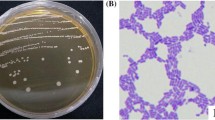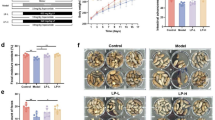Abstract
Functional constipation is one of the most common gastrointestinal disorders. Oxidative stress can aggravate organ dysfunction. Enteric neurotransmitters have significant effects on the regulation of the enteric nervous system and intestinal muscle contraction. Oxidative stress and reduced gastrointestinal motility are considered to be one of the main causes of constipation. This study aimed to investigate whether LimosiLactobacillus pentosus CQZC02 alleviated loperamide hydrochloride (Lop)-induced constipation in mice under high-fat diet (HFD) conditions and to elucidate the underlying mechanism, focusing on enteric neurotransmitters. Four-week-old female BALB/c mice were randomly divided into five groups: normal group (Nor), constipation model group (H-Lop), L. pentosus CQZC02 low-dose group (H-Lop + ZC02L), L. pentosus CQZC02 high-dose group (H-Lop + ZC02H), and LimosiLactobacillus bulgaricus control group (H-Lop + LB). The fecal weight, water content, and total gastrointestinal transit time were measured to determine whether the mice were constipated. Small bowel and colon tissue damage was assessed by hematoxylin and eosin staining, while the degree of damage was determined by double-blind scoring. The levels of serum oxidative stress markers malondialdehyde, superoxide dismutase, glutathione peroxidase, and catalase and neurotransmitters motilin, gastrin, substance P, endothelin, somatostatin, and vasoactive intestinal peptide were measured. The gene expression levels of endothelial nitric oxide synthase, inducible nitric oxide synthase, neuronal nitric oxide synthase, nuclear factor kappa-B, and cyclooxygenase-2 in small intestine tissue were calculated. The constipation symptoms of mice in H-Lop group were manifested by a variety of physiological indicators. In addition, compared with the H-Lop group, H-Lop + ZC02H could effectively relieve the symptoms of constipation in mice. In symptom characterization, the mice in the H-Lop + ZC02H group lost weight and increased feces and water content. In functional experiments, gastrointestinal motility was enhanced; the inflammation score of intestinal tissue was decreased, and gene expression levels were modulated; serum oxidative factor levels were modulated, and oxidative stress levels were decreased.





Similar content being viewed by others
Data Availability
The raw data supporting the conclusions of this article will be made available by the authors, without undue reservation.
References
Włodarczyk J, Waśniewska A, Fichna J, Dziki A, Dziki Ł, Włodarczyk M (2021) Current overview on clinical management of chronic constipation. J Clin Med. 16;10(8):1738. https://doi.org/10.3390/jcm10081738
Shimada Y, Terasawa M, Okazaki F, Nakayama H, Zang L, Nishiura K, Matsuda K, Nishimura N (2021) Rhamnan sulphate from green algae Monostroma nitidum improves constipation with gut microbiome alteration in double-blind placebo-controlled trial. Sci Rep. 5;11(1):13384. https://doi.org/10.1038/s41598-021-92459-7
Staller K, Olén O, Söderling J, Roelstraete B, Törnblom H, Song M, Ludvigsson JF (2022) Chronic constipation as a risk factor for colorectal cancer: results from a nationwide, case-control study. Clin Gastroenterol Hepatol 20(8):1867-1876.e2. https://doi.org/10.1016/j.cgh.2021.10.024
Lee HY, Kim JH, Jeung HW, Lee CU, Kim DS, Li B, Lee GH, Sung MS, Ha KC, Back HI, Kim SY, Park SH, Oh MR, Kim MG, Jeon JY, Im YJ, Hwang MH, So BO, Shin SJ, Yoo WH, Kim HR, Chae HJ, Chae SW (2012) Effects of Ficus carica paste on loperamide-induced constipation in rats. Food Chem Toxicol 50(3–4):895–902. https://doi.org/10.1016/j.fct.2011.12.001
Mukai R, Handa O, Naito Y, Takayama S, Suyama Y, Ushiroda C, Majima A, Hirai Y, Mizushima K, Okayama T, Katada K, Kamada K, Uchiyama K, Ishikawa T, Takagi T, Itoh Y (2020) High-fat diet causes constipation in mice via decreasing colonic mucus. Dig Dis Sci 65(8):2246–2253. https://doi.org/10.1007/s10620-019-05954-3
Taba Taba Vakili S, Nezami BG, Shetty A, Chetty VK, Srinivasan S (2015) Association of high dietary saturated fat intake and uncontrolled diabetes with constipation: evidence from the National Health and Nutrition Examination Survey. Neurogastroenterol Motil 27(10):1389–1397. https://doi.org/10.1111/nmo.12630
Zhang X, Hu B, Sun G, Zheng J, Hu H, Yang H et al (2022) Plasma metabolomic profiles reveal regulatory effect of chitosan oligosaccharides on loperamide-induced constipation in mice. J Pharm Biomed Anal 20(211):114590. https://doi.org/10.1016/j.jpba.2022.114590
Zhang X, Hu B, Sun G, Zheng J, Hu H, Yang H, Cheng X, Lin A, Liu H (2022) Fecal microbiota transplantation modulates the gut flora favoring patients with functional constipation. Front Microbiol 7(12):700718. https://doi.org/10.3389/fmicb.2021.700718
Chu JR, Kang SY, Kim SE, Lee SJ, Lee YC, Sung MK (2019) Prebiotic UG1601 mitigates constipation-related events in association with gut microbiota: a randomized placebo-controlled intervention study. World J Gastroenterol. 28;25(40):6129–6144. https://doi.org/10.3748/wjg.v25.i40.6129.
Huang J, Li S, Wang Q, Guan X, Qian L, Li J, Zheng Y, Lin B (2020) Pediococcus pentosaceus B49 from human colostrum ameliorates constipation in mice. Food Funct. 24;11(6):5607–5620. https://doi.org/10.1039/d0fo00208a.
Gan Y, Liang J, Diao W, Zhou X, Mu J, Pang L, Tan F, Zhao X (2020) LimosiLactobacillus plantarum KSFY06 and geniposide counteract montmorillonite-induced constipation in Kunming mice. Food Sci Nutr. 7;8(9):5128–5137. https://doi.org/10.1002/fsn3.1814.
Wei L, Singh R, Ha SE, Martin AM, Jones LA, Jin B, Jorgensen BG, Zogg H, Chervo T, Gottfried-Blackmore A, Nguyen L, Habtezion A, Spencer NJ, Keating DJ, Sanders KM, Ro S (2021) Serotonin deficiency is associated with delayed gastric emptying. Gastroenterology 160(7):2451-2466.e19. https://doi.org/10.1053/j.gastro
Silveira EA, Santos ASEAC, Ribeiro JN, Noll M, Dos Santos Rodrigues AP, de Oliveira C (2021) Prevalence of constipation in adults with obesity class II and III and associated factors. BMC Gastroenterol. 12;21(1):217. https://doi.org/10.1186/s12876-021-01806-5.
Szulinska M, Gibas-Dorna M, Miller-Kasprzak E, Suliburska J, Miczke A, Walczak-Gałezewska M, Stelmach-Mardas M, Walkowiak J, Bogdanski P (2017) Spirulina maxima improves insulin sensitivity, lipid profile, and total antioxidant status in obese patients with well-treated hypertension: a randomized double-blind placebo-controlled study. Eur Rev Med Pharmacol Sci 21(10):2473–2481 (PMID: 28617537)
Araújo AM, Botelho PB, Ribeiro DJS, Magalhães KG, Nakano EY, Arruda SF (2021) A multiple-strain probiotic product provides a better enzymatic antioxidant response in individuals with constipation in a double-blind randomized controlled trial. Nutrition 89:111225. https://doi.org/10.1016/j.nut.2021.111225
Hajji N, Wannes D, Jabri MA, Rtibi K, Tounsi H, Abdellaoui A, Sebai H (2020) Purgative/laxative actions of Globularia alypum aqueous extract on gastrointestinal-physiological function and against loperamide-induced constipation coupled to oxidative stress and inflammation in rats. Neurogastroenterol Motil 32(8):e13858. https://doi.org/10.1111/nmo.13858
Rai R, Singh S, Rai KK, Raj A, Sriwastaw S, Rai LC (2021) Regulation of antioxidant defense and glyoxalase systems in cyanobacteria. Plant Physiol Biochem 168:353–372. https://doi.org/10.1016/j.plaphy.2021.09.037
Abdulkareem Aljumaily SA, Demir M, Elbe H, Yigitturk G, Bicer Y, Altinoz E (2021) Antioxidant, anti-inflammatory, and anti-apoptotic effects of crocin against doxorubicin-induced myocardial toxicity in rats. Environ Sci Pollut Res Int 28(46):65802–65813. https://doi.org/10.1007/s11356-021-15409-w
Holland AM, Bon-Frauches AC, Keszthelyi D, Melotte V, Boesmans W (2021) The enteric nervous system in gastrointestinal disease etiology. Cell Mol Life Sci 78(10):4713–4733. https://doi.org/10.1007/s00018-021-03812-y
Lee DS, Jo HG, Kim MJ, Lee H, Cheong SH (2019) Laxative effects of taurine on loperamide-induced constipation in rats. Adv Exp Med Biol 1155:261–271. https://doi.org/10.1007/978-981-13-8023-5_25
Deng Z, Fu Z, Yan W, Nie K, Ding L, Ma D, Huang H, Li T, Xie J, Fu L (2021) The different effects of Chinese Herb Solid Drink and lactulose on gut microbiota in rats with slow transit constipation induced by compound diphenoxylate. Food Res Int 143:110273. https://doi.org/10.1016/j.foodres.2021.110273
Zhang X, Zheng J, Jiang N, Sun G, Bao X, Kong M, Cheng X, Lin A, Liu H (2021) Modulation of gut microbiota and intestinal metabolites by lactulose improves loperamide-induced constipation in mice. Eur J Pharm Sci 1(158):105676. https://doi.org/10.1016/j.ejps.2020.105676
Jin X, Guan Y, Bai H, Liu Y, Lv X (2020) Effects of sEA on slow transit constipation through the microbiota-gut-brain axis in rats. Evid Based Complement Alternat Med 14(2020):8828846. https://doi.org/10.1155/2020/8828846
Tan Q, Hu J, Zhou Y, Wan Y, Zhang C, Liu X, Long X, Tan F, Zhao X (2021) Inhibitory effect of Lactococcus lactis subsp. lactis HFY14 on diphenoxylate-induced constipation in mice by regulating the VIP-cAMP-PKA-AQP3 signaling pathway. Drug Des Devel Ther. 11;15:1971–1980. https://doi.org/10.2147/DDDT.S309675.
Liu W, Zhi A (2021) The potential of quercetin to protect against loperamide-induced constipation in rats. Food Sci Nutr. 4;9(6):3297–3307. https://doi.org/10.1002/fsn3.2296.
Tan W (2019) Gender differences and mechanisms of endothelial nitric oxide synthase responses to inflammatory stimuli in different tissues. Diss. Chongqing Medical University. GB/T 7714–2015
Özdemir-Kumral ZN, Koyuncuoğlu T, Arabacı-Tamer S, Çilingir-Kaya ÖT, Köroğlu AK, Yüksel M, Yeğen BÇ (2021) High-fat diet enhances gastric contractility, but abolishes nesfatin-1-induced inhibition of gastric emptying. J Neurogastroenterol Motil. 30;27(2):265–278. https://doi.org/10.5056/jnm20206.
Kumar J, Haldar C, Verma R (2021) Melatonin ameliorates LPS-induced testicular nitro-oxidative stress (iNOS/TNFα) and inflammation (NF-kB/COX-2) via modulation of SIRT-1. Reprod Sci 28(12):3417–3430. https://doi.org/10.1007/s43032-021-00597-0
Lin YM, Tang Y, Fu Y, Hegde S, Shi DW, Huang LM, Shi XZ (2020) An opioid receptor-independent mechanism underlies motility dysfunction and visceral hyperalgesia in opioid-induced bowel dysfunction. Am J Physiol Gastrointest Liver Physiol. 1;320(6):G1093-G1104. https://doi.org/10.1152/ajpgi.00400.2020.
Funding
This research was funded by Chongqing University Innovation Research Group Project (CXQTP20033) and Chongqing Kewei Joint Medical Research Project (NO.2021MSXM337).
Author information
Authors and Affiliations
Contributions
Xin Zhao and Yongpeng He contributed to conception and design of the study. Ruokun Yi performed the statistical analysis. Jia Liu and Shuaiqi Wang wrote the first draft of the manuscript. Xingyao Long and Guangli Luo wrote sections of the manuscript. All authors contributed to manuscript revision, read, and approved the submitted version.
Corresponding authors
Ethics declarations
Ethics Approval
This study was approved by the Ethics Committee of Collaborative Innovation Center for Child Nutrition and Health Development, Chongqing University of Education (2021100101B, Chongqing, China) and followed the national standard of the People’s Republic of China (GB/T 35892–2018) laboratory animal-guidelines for ethical review of animal welfare.
Conflict of Interest
The authors declare no competing interests.
Additional information
Publisher's Note
Springer Nature remains neutral with regard to jurisdictional claims in published maps and institutional affiliations.
Rights and permissions
Springer Nature or its licensor holds exclusive rights to this article under a publishing agreement with the author(s) or other rightsholder(s); author self-archiving of the accepted manuscript version of this article is solely governed by the terms of such publishing agreement and applicable law.
About this article
Cite this article
Liu, J., Wang, S., Yi, R. et al. LimosiLactobacillus pentosus Isolated from Mustard Relieves Drug-induced Constipation in Mice Fed a High-fat Diet by Modulating Enteric Neurotransmitter Function. Probiotics & Antimicro. Prot. 15, 1371–1381 (2023). https://doi.org/10.1007/s12602-022-09991-9
Accepted:
Published:
Issue Date:
DOI: https://doi.org/10.1007/s12602-022-09991-9




